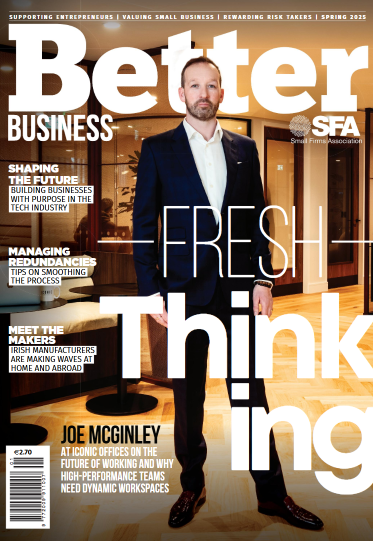Flender CEO Graham Byrne offers some advice on how small firms can best prepare for 2022 from a financial perspective
The resilience shown by the small business community in Ireland over the past two years has been inspiring, says Flender CEO Graham Byrne. Despite numerous lockdowns, harsh restrictions and a challenging trading environment, small firms have pivoted, diversified and proved their mettle in these unprecedented times. With Covid cases showing no sign of abating, it looks like we’re not out of the woods just yet. “I think we’re currently in the throes of our fourth recovery and rebound. To say that the past almost 24 months have been challenging for small businesses would be an understatement. I think the key to those recovering whilst managing to rebound is engagement with key stakeholders within business’ individual industries. I would expect that any financial supports or grants that are available from the Government will continue into 2022 to enable this critical recovery to happen.”
Small business should avail of any financial assistance that’s available to them. “In saying that, I think there needs to be a greater level of awareness of the supports that are out there, whether that’s access to finance, access to training or assisting firms with their transition to digital. I think awareness of the supports that are out there has fallen off the radar somewhat but right now, we’re in a critical period so it’s imperative that small businesses gather the facts so they can access the help that’s out there.”
In an earlier issue of Better Business, Graham talked about the slow take-up of the Credit Guarantee Scheme (CGS). It’s widely agreed that the CGS is an attractive option for small firms, but the challenge lies around how small firms are accessing it. “The low level of applications to draw down the €2 billion facility continued throughout 2021. Again, I think it goes back to a lack of awareness about the scheme and also a lack of awareness about who’s actually facilitating the scheme. There are over 15 funding support structures currently available to small firms, of which the CGS is only one. So there may be some confusion when it comes to identifying the scheme. There also seems to be confusion around who is actually distributing it and how small firms qualify for the scheme.” More education about the scheme and indeed about all the schemes and supports available to small businesses needs to be pushed out into the marketplace through intermediate groups like accountancy and advisory firms, says Graham. That will encourage people and give them the confidence to move forward with their applications. “A very substantial number of schemes were also launched at the same time and that’s likely adding to the confusion. Very little emphasis has been put on the extension or top-up nature of these schemes, which is crucial information for small businesses. People think that the schemes are full or that they’re not in a position to apply. Quite a lot of small firms have told me they didn’t even know that a particular scheme was still open.”
As we move forward, the single biggest issue for the economy is the extreme contraction of our banking market and the supports available to the SME community. “Before the credit crisis, we had 11 operating institutional banks servicing the SME space. Now, we effectively only have two. With that contraction comes huge issues; as you can imagine, there’s a reluctance from banking institutions to do business with customers from competing banks so if you’re looking for additional supports, you generally have to approach your own bank. That’s creating a very uncompetitive environment from an SME perspective.”
In his 15 years of non-bank funding to the SME market, Graham has found that the biggest challenge for funders is the lack of financial sophistication within small business. “Small firms need a huge amount of support when it comes to implementing structures to facilitate financial training for employees. External stakeholders such as lending institutions must be able to access a business’ financial information in a straightforward, coherent way.” Financial sophistication for small business has always been an issue, says Graham. “It was an issue before the credit crisis and because it was completely ignored, it became an even bigger problem after the credit crisis. It’s an issue that continues to unfold now and is presenting small firms with additional challenges.” Skillnet Ireland is an excellent resource for small business, says Graham, providing firms with business advice, consultancy, access to finance and training. “Skillnet also provides financial sophistication training for financial managers within small businesses, along with advice on how to actually manoeuvre around the pandemic as it unfolds. Small firms are exactly that – small. They usually have a tightknit, small number of employees and it’s usually the business owner that’s trying to be the best salesperson and promoter of that business. The aim of any small business is to generate revenue; the sticking point is around what happens to that revenue down the line. I would really urge small firms to access the Skillnet resource and equip themselves with the financial sophistication training they need in order to access the supports that will help them to survive the pandemic.”
It’s not just Covid that’s impacting small firms. Supply chain issues, the likes of which haven’t been seen in several years, are creating additional obstacles for small firms to overcome. “For small firms, supply chain issues are leading to a delay in the payment cycle, both to suppliers and from debtors. Effective planning around these gaps in the supply chain can go some way in mitigating these issues. Small firms should try negotiating with their suppliers and customers and come to an agreement over terms that actually map the new environment that they’re in. That way, they can offset some of those issues.”
Going into 2022, there are measures that small firms can take to protect themselves from the consequences of Covid and the other issues challenging the SME environment. “I think small firms need to have a lot more sophistication when it comes to planning the reboot and recovery of their business. Maintaining strong employee engagement is also key; employees are a business’s best asset and therefore most likely to help and assist small firms as they recover and stabilise and hopefully, return to profitability.”




